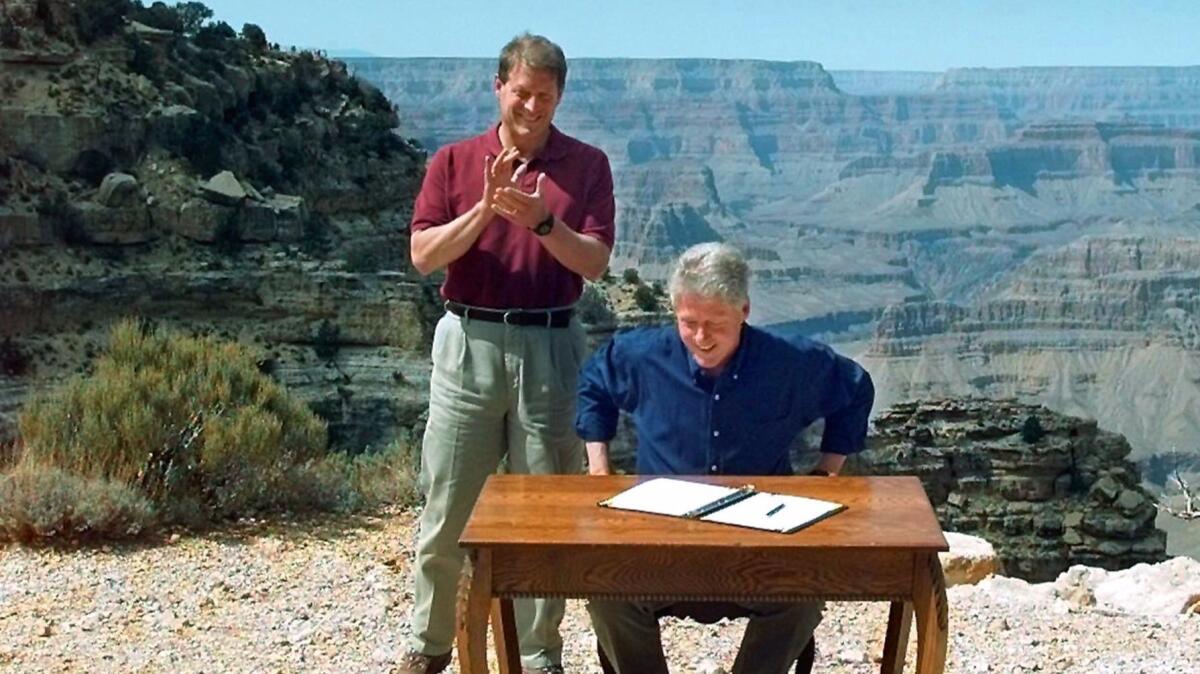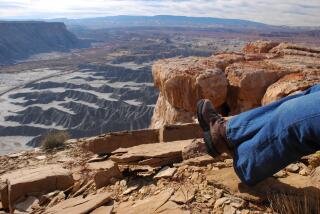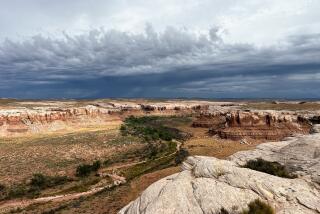In an unprecedented action, Trump dramatically shrinks two national monuments in Utah
Reporting from Salt Lake City — President Trump formally reconfigured two big national monuments in southern Utah on Monday, shrinking them by more than 2 million acres and establishing five smaller units within them — a public lands declaration unlike any ever made by a U.S. chief executive.
“You know how best to take care of your land,” the president said to a large audience at the Utah state Capitol. “You know best how to conserve this land for generations.”
Calling the designation of Bears Ears and Grand Staircase-Escalante national monuments an abuse of federal authority and the work of “distant bureaucrats,” the president added: “I’ve come to Utah to reverse federal overreach and restore the rights to this land to your citizens.”
The proclamations Trump signed reduce the 1.9 million-acre Grand Staircase-Escalante monument to 1,006,341 acres, while Bears Ears, which was 1.35 million acres, will shrink to 228,784 acres.
The Grand Staircase monument were was established by President Clinton and Bears Ears was established by President Obama. Both vastly increased the amount of land and water protected by the federal government in southern Utah.
Trump’s decision drew immediate vows of legal challenges. Protests also occurred here on Saturday and Monday. The president’s national monuments decision forms another front line in the administration’s disputed campaign to reverse Obama-era public lands and environmental policy and to energize his base of political support in the rural West.
It also subjected one of the country’s wildest regions, a three-county stretch of deep canyons, mesa, and red rock — home to few roads and roughly 28,000 people — to uncommon national scrutiny.
Trump’s actions produced ample applause among supporters as Trump made his announcement. He emphasized that the boundary changes were intended to return control of public lands to those who know and use them most closely.
“Some people think that the natural resources of Utah should be controlled by a small handful of very distant bureaucrats located in Washington,” he told the audience. “And guess what, they’re wrong.”
With his redesignation, he said, “Public lands will once again be for public use.”
The president’s actions were a dramatic departure from conventional interpretations of the 1906 Antiquities Act, on which the monument designations are based. The act, advocated by President Theodore Roosevelt, was designed to provide safeguards to exceptional historic, cultural, and natural landscapes across the country, most of them located in the West’s public domain.
The Antiquities Act provides broad authority to presidents to act alone in establishing national monuments. Presidents have declared more than 150 national monuments, many of which became national parks. Four of Utah’s five national parks started as national monuments.
Trump said the act was never designed to create monuments of the size of the two in Utah. “These abuses of the Antiquities Act give enormous power to far-away bureaucrats at the expense of the people who live here and work here and make this place their home,” he said.
Though previous presidents have adjusted national monuments more than 80 times, all but 18 of those changes were made to expand monument boundaries, according to an Interior Department accounting. Though President Wilson removed over 313,000 acres from the Mount Olympus National Monument in 1915, none has come close to reducing boundaries by as much as the roughly 2 million acres that Trump removed from federal protection at Bears Ears and Grand Staircase-Escalante national monuments.
“I’m a real estate developer,” Trump said. “When they start talking about millions of acres, I say, ‘Say it again?’ Because that’s a lot.”
The president, who was accompanied by Interior Secretary Ryan Zinke, was warmly received at the state Capitol.
Zinke and other speakers characterized the boundary changes as a courageous effort by Trump to “keep a promise” and respond to the deep hurt that rural Utah communities say they experienced when both monuments were established.
“This is about giving rural America a voice,” said Zinke. “There are not many presidents that do what he is about to do.” He added: “The president is doing this for the right reasons to make sure that Utah has a voice.”
“The little guys’ voices were heard,” said state Rep. Gregory H. Hughes, the speaker of the Utah House of Representatives. “Voices in the community were heard. This administration has the strength and the will to be there for us. This is a great day for Utah.”
“When Bears Ears was designated, it was disheartening for my community,” said Rebecca Benally, a Navajo and commissioner of San Juan County, where the monument is. She added: “It was insulting that bureaucrats thousands of miles away didn’t believe we were capable of protecting our land.”

President Trump signed two proclamations in Salt Lake City on Dec. 4, 2017, that dramatically altered the boundaries and removed 2 million acres of protected federal land from two big national monuments in Utah.
Trump’s declaration sets the stage for a court battle over presidential authority to rescind the boundaries of a national monument. Legal scholars assert that neither the Antiquities Act nor the 1976 Federal Land Policy and Management Act allow such striking changes to national monuments by a president. That authority, they assert, rests solely with Congress.
The Inter Tribal Coalition, a Native American group, is filing a lawsuit immediately to protect Bears Ears. Patagonia, the outdoor clothing manufacturer, is joining Friends of Cedar Mesa, Utah Dine Bikeyah, and Archaeology Southwest in a Bears Ears suit to be filed later this week.
Ten national and regional environmental groups are filing a lawsuit in federal district court in Washington today to protect Grand Staircase-Escalante National Monument.
“The president lacks the authority under the Antiquites Act to repeal national monuments like he tried today,” said Steve Bloch, the legal director of the Southern Utah Wilderness Alliance, an environmental group in Salt Lake City. “We argue that when Congress passed the Antiquities Act it delegated to the president the authority to establish national monuments, not to repeal or rescind them The president is trying to take more authority than Congess has granted him.”
One of the motivations for changing the boundaries is improving access to coal, oil, natural gas and uranium.
An analysis of the potential for resource development by Bloch’s group found that revoking the original boundaries and establishing smaller monuments opens Grand Staircase-Escalante’s coal reserves to development. Uranium, and oil and gas reserves, become much easier to develop beyond the boundaries of the two smaller monuments carved from Bears Ears.
The president acted at the urging of Utah’s Republican congressional delegation, which resisted the decisions by Presidents Clinton and Obama to establish the two monuments. Utah’s lawmakers insist that the two Democrats overreached in establishing Bears Ears and Grand Staircase-Escalante by not adequately considering the views of state residents. The Obama administration disputed that characterization, arguing that it held many public meetings and invited public comment.

Public opinion surveys have consistently found that Utah residents are about evenly divided on whether to shrink or maintain the existing boundaries of Bears Ears and Grand Staircase-Escalante.
“This is unprecedented — and it’s illegal,” Rhea Suh, president of the Natural Resources Defense Council, said in a statement. “Presidents use the Antiquities Act to create national monuments and protect our special lands and waters for future generations. This president thinks he can use it to destroy them. He does not have that authority. What’s next, President Trump — the Grand Canyon? See you in court.”
In April, Trump signed an executive order that directed the Interior Department to review 27 monuments established since 1996. The department received nearly 3 million comments. Most expressed support for keeping national monument boundaries and management practices intact.
The Interior Department said it would make public the findings of its review of the 25 other national monuments on Tuesday.
ALSO
Industries that cheered Trump’s climate regulation rollbacks now worry they’ll go too far
Trump fully endorses Alabama Senate candidate Roy Moore
Follow Keith Schneider, Western environment and public lands correspondent, on Twitter.
UPDATES:
3:15 p.m.: The story was updated with additional details.
12:10 p.m.: This article was updated with additional details of the proclamations.
11:35 a.m.: This article was updated with Trump’s announcement.
This article was originally posted at 7 a.m.
More to Read
Sign up for Essential California
The most important California stories and recommendations in your inbox every morning.
You may occasionally receive promotional content from the Los Angeles Times.










